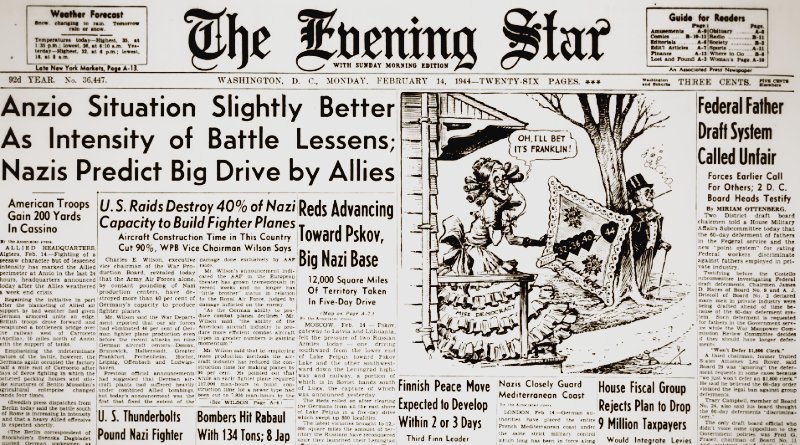World War II Chronicle: February 14, 1944
Click here for TODAY’S NEWSPAPER
George Fielding Eliot criticizes the public rantings of theater commanders such as Generals MacArthur and Stillwell in his column on page six… Sports on page 11, and Connie Mack tells Grantland Rice he thinks that this baseball season will be more competitive, despite losing so much talent to the war…
Page 12 discusses the huge disparity between the Army and Navy when it comes to awarding medals. The Army has seven million men serving to the Navy’s (and Marine Corps’) two million, but the chart shows the differences between the service for each award. Maj. Gregory “Pappy” Boyington, the Marine ace whose 26 kills is tied for the lead among all American aviators, reportedly hasn’t even received a decoration at all.
Roving Reporter by Ernie Pyle
IN ITALY — Here’s that man again, for better or for worse.
It’s a good thing the winning of the war doesn’t depend on me. If my business were shooting Germans, I’d never get the trigger pulled for sneezing. Each zero hour would have to be postponed until I found my liniment and hot-water bottle.
I am the chief depository overseas of the common American cold. One cold at a time is not good enough for me, nor even two. In the past five weeks I’ve piled three colds on one top of the other.
The main trouble is that I’m allergic to the remedies that benefit other people. Things work backwards on me. Any doctor who takes my case is lost before he starts.
Codeine and aspirin make me much worse. Sleeping tablets keep me away. Stimulating doses put me to sleep. it’s been proved that I cannot take my vitamins. Tonics destroy my appetite. Cough syrup throws me into convulsions of whooping. I would suggest that an efficient hanging from the nearest olive tree is my only panacea.
Please try to forgive me for this recent absenteeism, and I pray that it doesn’t happen too often. I don’t want you to find out how well the war can get along without me.
Late though it is, I can’t pass back to the war without a last word for Ray Clapper, who went to his death in the Pacific. His passing hit us hard over here.
He had many friends in the war theater, as he had in the others. He traveled to all the wars because he felt it his duty to inform himself, and everywhere he went he was liked for himself and respected for his fine mind.
We had known each other for 20 years. He was always generous and thoughtful of me. Time and again he went out of his way to do little things that would help me, and to say nice things about me in his column, and I cannot remember that I ever did one thing for him. Those accusing regrets come in when it is too late.
War correspondents try not to think of how high their ratio of casualties has been in this war. At least they try not to think of it in terms of themselves, but Ray Clapper’s death sort of set us back on our heels. Somehow it always seemed impossible that anything could ever happen to him. It made us wonder who is next.
When the Stars and Stripes announced Ray Clapper’s death, I think the most frequent comment in this area was one that would have made Ray proud. People said:
“The old story again. It’s always the best ones that get it.”
Here is our final report on that bottle of Coca-Cola that was raffled off last month in a field-artillery brigade on the Italian front.
It all started in November when a former member of this brigade, now back in the States — Pfc. Frederick Williams, of Daytona Beach, Fla., — sent two bottles of coke to two of his buddies still over here — Corp. Victor Glover of Daytona Beach and Sergt. Woodrow Daniels of Jacksonville, Fla.
Nobody in the outfit had seen a Coca-Cola in more than a year, so they drank one and then began having ideas about the other. At last they decided to put it up in a raffle, and use the proceeds to care for children whose fathers had been killed in the brigade.
The lottery was announced in the brigade’s little mimeographed newspaper, and chances on the coke were put on sale at 25 cents apiece. Before the first week was up the cash box had more than $1,000 in it.
The money came in quarters, dollars, shillings, pounds, francs and lire. They had to appoint a committee to administer the affair. At the end of the third week the fund exceeded $3,000. Then Pvt. Lamyl Yancey, of Harlen Ky., got a miniature bottle of Coca-Cola and he put it up as a second prize.
Just before the grand drawing the fund reached $4,000. Then the slips were put in a German shell case, and the brigade commander drew out two numbers.
The winnah and new champion was Sergt. William de Schneider of Hackensack, N.J. The little bottle went to Sergt. Lawrence Presnell of Fayateeville, N.C.
Sergeant de Schneider was appalled by what happened to him. That one coke was equivalent in value of 20,000 bottles back home. I don’t think I care to drink a $4,000 bottle,” he said. “I think I’ll send it home and keep it a few years.”
Evening star. (Washington, D.C.), 14 February 1944. Chronicling America: Historic American Newspapers. Lib. of Congress.
https://chroniclingamerica.loc.gov/lccn/sn83045462/1944-02-14/ed-1/
